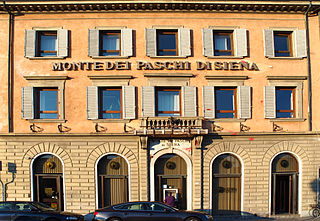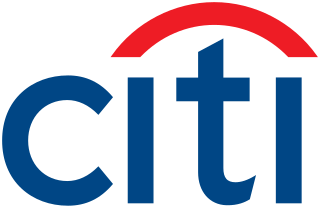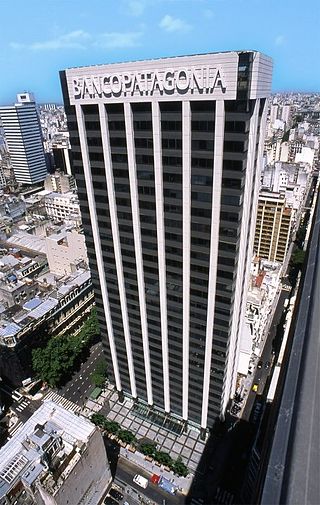
A commercial bank is a financial institution that accepts deposits from the public and gives loans for the purposes of consumption and investment to make a profit.

A financial institution, sometimes called a banking institution, is a business entity that provides service as an intermediary for different types of financial monetary transactions. Broadly speaking, there are three major types of financial institution:
- Depository institution – deposit-taking institution that accepts and manages deposits and makes loans, including bank, building society, credit union, trust company, and mortgage broker;
- Contractual institution – insurance company and pension fund
- Investment institution – investment bank, underwriter, and other different types of financial entities managing investments.

The Bank of America Corporation is an American multinational investment bank and financial services holding company headquartered at the Bank of America Corporate Center in Charlotte, North Carolina, with investment banking and auxiliary headquarters in Manhattan. The bank was founded by the merger of NationsBank and Bank of America in 1998. It is the second-largest banking institution in the United States and the second-largest bank in the world by market capitalization, both after JPMorgan Chase. Bank of America is one of the Big Four banking institutions of the United States. It serves about 10 percent of all American bank deposits, in direct competition with JPMorgan Chase, Citigroup, and Wells Fargo. Its primary financial services revolve around commercial banking, wealth management, and investment banking.

Financial services are economic services tied to finance provided by financial institutions. Financial services encompass a broad range of service sector activities, especially as concerns financial management and consumer finance.
Banco Bradesco S.A. is a Brazilian financial services company headquartered in Osasco, in the state of São Paulo, Brazil. It is the third largest banking institution by assets in Brazil and Latin America. It is also one of fifty most valuable banks in the world. The bank is listed at the B3 in São Paulo, where it is part of the Índice Bovespa, in the New York Stock Exchange and in the Madrid Stock Exchange.

Bank of New Zealand (BNZ) is one of New Zealand's big four banks. It has been operating since October 1861, and since 1992 has been owned by National Australia Bank (NAB), retaining local governance with a New Zealand board of directors. The bank operates a variety of financial services covering retail, business, and institutional banking.

Postal savings systems provide depositors who do not have access to banks a safe and convenient method to save money. Many nations have operated banking systems involving post offices to promote saving money among the poor.

Citibank Canada, operating as Citi Canada, is the Canadian subsidiary of the American multinational financial services corporation Citigroup. Citi Canada is headquartered in Toronto, Ontario, with offices in Calgary, London, Ontario, Montreal, Mississauga, and Vancouver.

A community development bank (CDB) or Community Development Financial Institution (CDFI) is a development bank or credit union that focus on serving people who have been locked out of the traditional financial systems such as the unbanked or underbanked in deprived local communities. They emphasize the long term development of communities and provide loans such as micro-finance or venture capital.

Chang Hwa Bank is a Taiwan-based financial institution that offers both retail and commercial banking services to private and corporate customers.
The Farm Credit System (FCS) in the United States is a nationwide network of borrower-owned lending institutions and specialized service organizations. The Farm Credit System provides more than $373 billion in loans, leases, and related services to farmers, ranchers, rural homeowners, aquatic producers, timber harvesters, agribusinesses, and agricultural and rural utility cooperatives. As of 2021, the Farm Credit System provides more than 45% of the total market share of US farm business debt.

Retail banking, also known as consumer banking or personal banking, is the provision of services by a bank to the general public, rather than to companies, corporations or other banks, which are often described as wholesale banking.

A non-banking financial institution (NBFI) or non-bank financial company (NBFC) is a financial institution that is not legally a bank; it does not have a full banking license or is not supervised by a national or international banking regulatory agency. NBFC facilitate bank-related financial services, such as investment, risk pooling, contractual savings, and market brokering. Examples of these include hedge funds, insurance firms, pawn shops, cashier's check issuers, check cashing locations, payday lending, currency exchanges, and microloan organizations.

Bangladesh is a developing country with an impoverished banking system, particularly in terms of the services and customer care provided by the government run banks. In recent times, private banks are trying to imitate the banking structure of the more developed countries, but this attempt is often foiled by inexpert or politically motivated government policies executed by the central bank of Bangladesh, Bangladesh Bank. The outcome is a banking system fostering corruption and illegal monetary activities/laundering etc. by the politically powerful and criminals, while at the same time making the attainment of services or the performance of international transactions difficult for the ordinary citizens, students studying abroad or through distance learning, general customers etc.

A bank is a financial institution that accepts deposits from the public and creates a demand deposit while simultaneously making loans, mobilising saver surplus to deficit spenders. Lending activities can be directly performed by the bank or indirectly through capital markets.
The New York State Banking Department was created by the New York Legislature on April 15, 1851, with a chief officer to be known as the Superintendent. The New York State Banking Department was the oldest bank regulatory agency in the United States.

Banco Patagonia is an Argentine commercial bank headquartered in Buenos Aires, and has 200 service points located in the main cities and capitals of the provinces of Argentina. The company operates in the individual, as well as small and medium-sized business banking segments, and has currently more than 775,000 clients.

Bangladesh Development Bank PLC. is a state-owned commercial bank in Bangladesh. As a Public Limited Company, BDBL formally embarked on its journey on January 03, 2010. It extends financial assistance for setting up industries and provides all kinds of commercial banking services to its customers through its branch network in Bangladesh.

Sarmayeh Bank is a major Iranian banking establishment offering retail, commercial and investment banking services. The company was established in 2005 as a part of the government's privatization of the banking system.
Savings and Loans Company is a statutory term used for non-bank financial institutions in Ghana. There are 37 Savings and Loans Companies released by the Bank of Ghana as at January 2017. Such institutions are licensed by the Bank of Ghana under the Financial Institutions non-Banking Law 1993.











